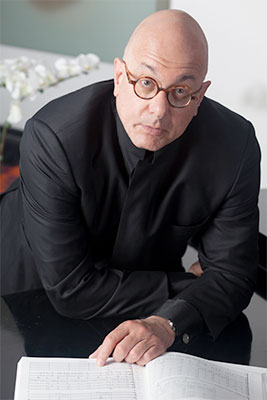 Photo by Ric KallaherLeon Botstein, Ph.D., has been awarded the 2014 Caroline P. and Charles W. Ireland Distinguished Visiting Scholar Prize, presented by the University of Alabama at Birmingham.
Photo by Ric KallaherLeon Botstein, Ph.D., has been awarded the 2014 Caroline P. and Charles W. Ireland Distinguished Visiting Scholar Prize, presented by the University of Alabama at Birmingham.
While at UAB to accept the prize, Botstein will conduct a special performance of the Alabama Symphony Orchestra, free and open to the public, at 8 p.m. Thursday, March 13, at UAB’s Alys Stephens Performing Arts Center, 1200 10th Ave. South. On the program is Symphony in A major by Camille Saint-Saëns and Symphony in F major, Op. 9 by Hermann Goetz. For more information, call 205-975-0756. Botstein will also lecture and meet with students and faculty in the UAB College of Arts and Sciences. For more information about the Botstein concert, visit www.uab.edu/cas.
Botstein has a passion for music and education. He is president of Bard College in Annandale, N.Y., and musical director and principal conductor of the American Symphony Orchestra. At Bard College, Botstein is also the Leon Levy Professor in the Arts and Humanities. He received M.A. and Ph.D. degrees in European history from Harvard. He was awarded the National Arts Club Gold Medal in 1995, the Centennial Medal of the Harvard Graduate School of the Arts and Sciences in 1996, and the Award for Distinguished Service to the Arts from the American Academy of Arts and Letters in 2003.
In his role as music director and principal conductor of the American Symphony, Botstein is known for producing performances that engage the mind and spirit. He is co-artistic director of the Summerscape and Bard music festivals and is conductor laureate of the Jerusalem Symphony Orchestra, where he was music director from 2003 to 2011. Botstein edits The Musical Quarterly and is the 2013 recipient of the Bruckner Society’s Julio Kilenyi Medal of Honor for his interpretations of that composer’s music.
As Botstein is a musical historian and musicologist, his contributions have helped reset thinking about composition, theory and performance. Botstein says his interest in refreshing the experience of listening to live music is what catalyzed his plans for the Birmingham concert.
“That is the inspiration for the program for this occasion,” Botstein said. “I would like to explore the era in the history of the symphony between the death of Schumann and the premiere of the first symphony of Brahms. For most audiences this is a historical black hole. And yet there is so much wonderful music to be heard from that period. The concert program that we will perform offers two examples of accessible, captivating symphonies that you will rarely be able to hear in live performance.”
Botstein has never been to Birmingham but says he is excited about his visit.
“I’m very thrilled to receive the Ireland Prize from the University of Alabama at Birmingham and to conduct the Alabama Symphony,” he said. “My friend and colleague James Bagwell, the chair of the Music Department at Bard and director of The Collegiate Chorale in New York, is from Birmingham, and his warm feeling for his native city has added to my enthusiasm and gratitude at being invited to speak and conduct there. This is an unexpected pleasure and honor.”
The Caroline P. and Charles W. Ireland Distinguished Visiting Scholar Prize brings to the UAB campus outstanding scholars who are generally recognized as figures of distinction in the arts and sciences. During their time on campus, these prize winners give a public lecture and share their knowledge through informal meetings with students and members of the faculty. UAB faculty nominate candidates for consideration each year, evaluating individuals who have achieved international excellence in their fields of study and who can share their enthusiasm and knowledge with the university community. The annual Ireland Visiting Scholar Prize awards the recipient $10,000.